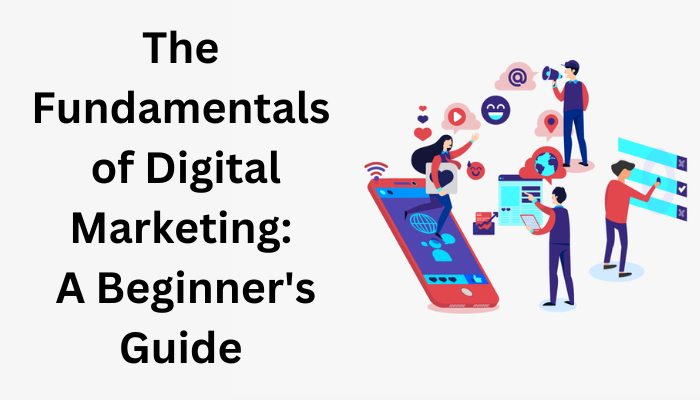
The fundamentals of digital marketing are the essential concepts and strategies that form the foundation of successful online marketing. These principles guide businesses and marketers in promoting products, services, or brands on digital platforms.
Here are the key fundamentals of digital marketing:
These fundamentals of digital marketing provide a comprehensive overview of the core principles and strategies required for businesses and marketers to thrive in the online landscape. Successful digital marketing involves a combination of these elements tailored to the specific goals and target audience of a campaign or business.
Introduction of Digital Marketing -:
Digital marketing is a dynamic and versatile approach to promoting products, services, or brands using digital technologies and online platforms. It has revolutionized the way businesses reach and engage with their target audience in the digital age.
At its core, digital marketing leverages the internet's vast reach to connect with potential customers, build brand awareness, and drive conversions. This marketing strategy provides several advantages, such as precise audience targeting, real-time data analytics, cost-effectiveness, and the ability to adapt quickly to changing trends. In a world where online presence is paramount, digital marketing is an essential tool for businesses and organizations of all sizes to remain competitive, engage with their audience, and achieve their marketing goals.
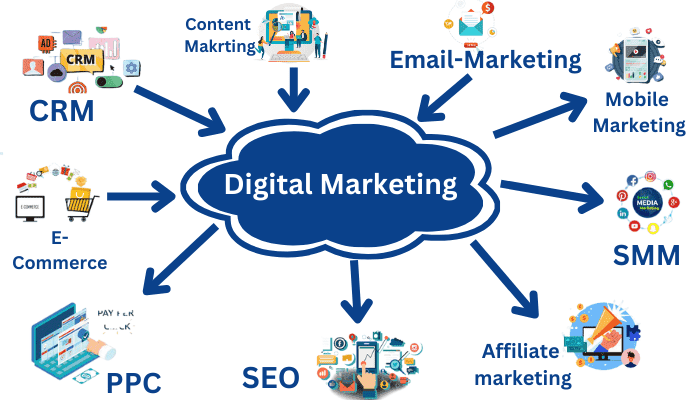
Search Engine Optimization (SEO)-:
Search Engine Optimization (SEO) is a fundamental digital marketing strategy aimed at improving a website's visibility in search engine results pages (SERPs). It involves optimizing various elements of a website to make it more appealing to search engines like Google, Bing, and Yahoo. The ultimate goal of SEO is to rank higher in organic (unpaid) search results, which, in turn, can drive more organic, high-quality traffic to a website.
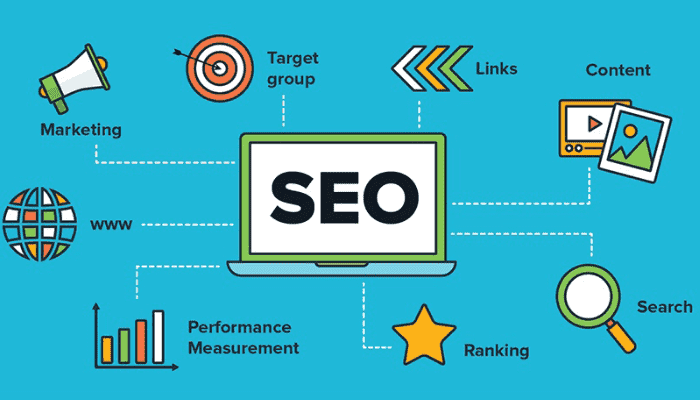
Search Engine Optimization is a dynamic and ever-evolving field that plays a crucial role in ensuring your website is discoverable by users searching for your products, services, or information. It requires a combination of keyword research, technical expertise, content creation, and continuous monitoring to improve your website's ranking and visibility on search engines. By understanding and implementing these SEO principles, businesses and website owners can enhance their online presence and reach their target audience more effectively.
Content marketing-:
Content marketing is a strategic approach to creating and distributing valuable, relevant, and consistent content to attract and engage a target audience. The goal is to build trust, establish authority, and ultimately drive profitable customer action.
Central to content marketing is the creation of various types of content, including blog posts, articles, videos, infographics, podcasts, and more. This content is designed to address the needs and interests of your audience, providing solutions to their problems, answers to their questions, or simply valuable information.
Content marketing is a long-term strategy that requires dedication and adaptability. When done right, it can lead to increased brand awareness, customer loyalty, and ultimately, business growth. It's about providing real value to your audience, which, in turn, translates into a valuable relationship between your brand and its customers.
Email marketing-:
Email marketing is a highly effective digital marketing strategy that involves sending emails to a group of people or a specific audience to promote products, services, or engage with subscribers. This form of direct communication provides a valuable way to connect with your audience, build relationships, and achieve various marketing goals.
Email marketing is a powerful tool for building and maintaining relationships with your audience, converting leads into customers, and achieving your marketing objectives. When executed strategically, it can deliver a high return on investment and contribute to the long-term success of your business or organization.
Mobile marketing-:
Mobile marketing is a digital marketing strategy focused on reaching and engaging consumers through mobile devices, such as smartphones and tablets. With the increasing prevalence of mobile technology, this approach has become essential for businesses looking to connect with their target audience effectively.
Mobile marketing is driven by the need to provide a seamless and personalized experience to consumers on their mobile devices. It allows businesses to reach users at the right time and in the right place, making it an integral part of modern marketing strategies.
Social media marketing-:

Social media marketing is a dynamic digital marketing strategy focused on utilizing social media platforms to connect with a target audience, build brand awareness, and achieve marketing objectives. It involves creating and sharing content tailored to each platform, engaging with followers, and analyzing performance to refine your approach.
Social media marketing offers a direct channel for businesses to engage with their audience, share their story, and drive action. When executed effectively, it can enhance brand recognition, drive website traffic, and lead to higher conversion rates, contributing to overall business success.
Customer Relationship Management (CRM)-:
Customer Relationship Management (CRM) is a business strategy and technology that focuses on building and maintaining strong relationships with customers. It involves collecting, organizing, and analyzing customer data to better understand their needs, preferences, and behavior. CRM systems and practices enable businesses to tailor their products, services, and marketing efforts to meet customer expectations. By improving customer satisfaction and loyalty, CRM helps drive sales and profitability. It also streamlines communication and collaboration across an organization to provide a unified customer experience. Effective CRM fosters long-term customer relationships and is essential for sustainable business success in today's competitive market.
Pay-Per-Click (PPC)-:
Pay-Per-Click (PPC) advertising is an online advertising model in which advertisers pay a fee each time their ad is clicked. It's a highly targeted and cost-effective approach that allows businesses to display ads on various platforms, most commonly search engines like Google, social media networks, and websites.
PPC advertising offers a flexible and measurable way for businesses to promote their products or services. It allows for quick results and precise targeting, making it an integral part of many digital marketing strategies. By effectively managing campaigns and optimizing ad performance, businesses can maximize the return on their advertising investment.
Affiliate marketing-:
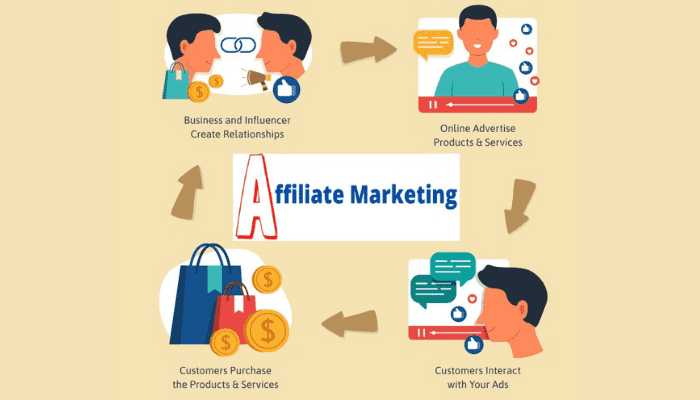
Affiliate marketing is a performance-based online marketing strategy that allows businesses to expand their reach by partnering with individuals or other businesses (affiliates). Affiliates promote the products or services of the business through their own marketing efforts and earn a commission for each sale, lead, or action generated through their referrals.
One unique aspect of affiliate marketing is its cost-effectiveness. Businesses only pay affiliates when they successfully drive a desired outcome, which can be a sale, a sign-up, or any other pre-defined action, making it a low-risk investment.
Affiliate marketing leverages the power of a diverse network of affiliates who may have niche audiences or specialized marketing skills. This allows businesses to access new markets and target audiences they might not reach through traditional advertising alone.
Moreover, the model encourages affiliates to be highly motivated and creative in their promotional efforts since their earnings are directly tied to their performance. Affiliate marketing is a win-win strategy, offering businesses extended reach and affiliates the opportunity to earn income through their marketing efforts.
E-commerce-:
E-commerce, short for electronic commerce, refers to the buying and selling of goods and services over the internet. E-commerce businesses operate entirely online, allowing customers to browse, select, and purchase products from the comfort of their homes or mobile devices. With secure payment options and efficient delivery systems, e-commerce has revolutionized the way people shop. It offers businesses a global reach, reduced operational costs, and the ability to personalize customer experiences. E-commerce encompasses various models, including business-to-consumer (B2C), business-to-business (B2B), and peer-to-peer (P2P) transactions. It continues to grow and evolve, providing consumers with convenience and businesses with new opportunities for growth and innovation.
In summary, this beginner's guide to the fundamentals of digital marketing has covered the key aspects of this dynamic field. From building your online presence to leveraging different marketing channels and continuously adapting your strategies, the world of digital marketing offers numerous opportunities for those willing to learn, experiment, and engage with their target audience. Whether you're a small business owner, a marketing professional, or an aspiring digital marketer, these fundamentals provide a solid foundation for your digital marketing journey.
 How to Turn Your Photos into Ghibli-Style Art with ChatGPT for Free
How to Turn Your Photos into Ghibli-Style Art with ChatGPT for Free Top 10 AI Tools for Plagiarism-Free Content Writing: Boost Your SEO & Digital Marketing Efforts
Top 10 AI Tools for Plagiarism-Free Content Writing: Boost Your SEO & Digital Marketing Efforts The Rise of Graphic Designing in 2025: A Career Guide.
The Rise of Graphic Designing in 2025: A Career Guide. The Rise of Video Editing: A Crucial Skill in 2025
The Rise of Video Editing: A Crucial Skill in 2025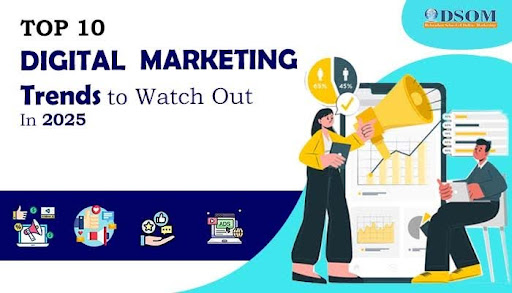 Top 10 Digital Marketing trends in 2025
Top 10 Digital Marketing trends in 2025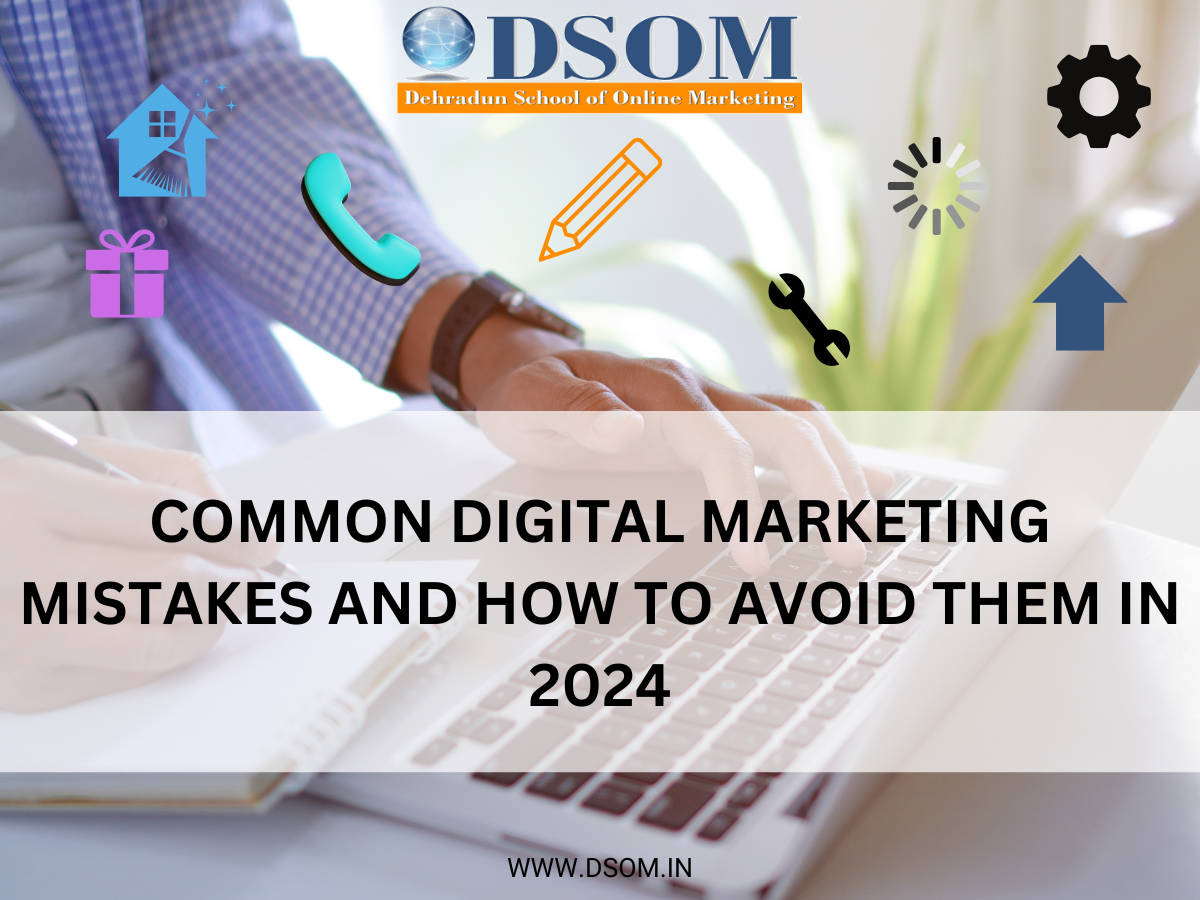 Common Mistakes in Digital Marketing and How to Avoid Them 2025
Common Mistakes in Digital Marketing and How to Avoid Them 2025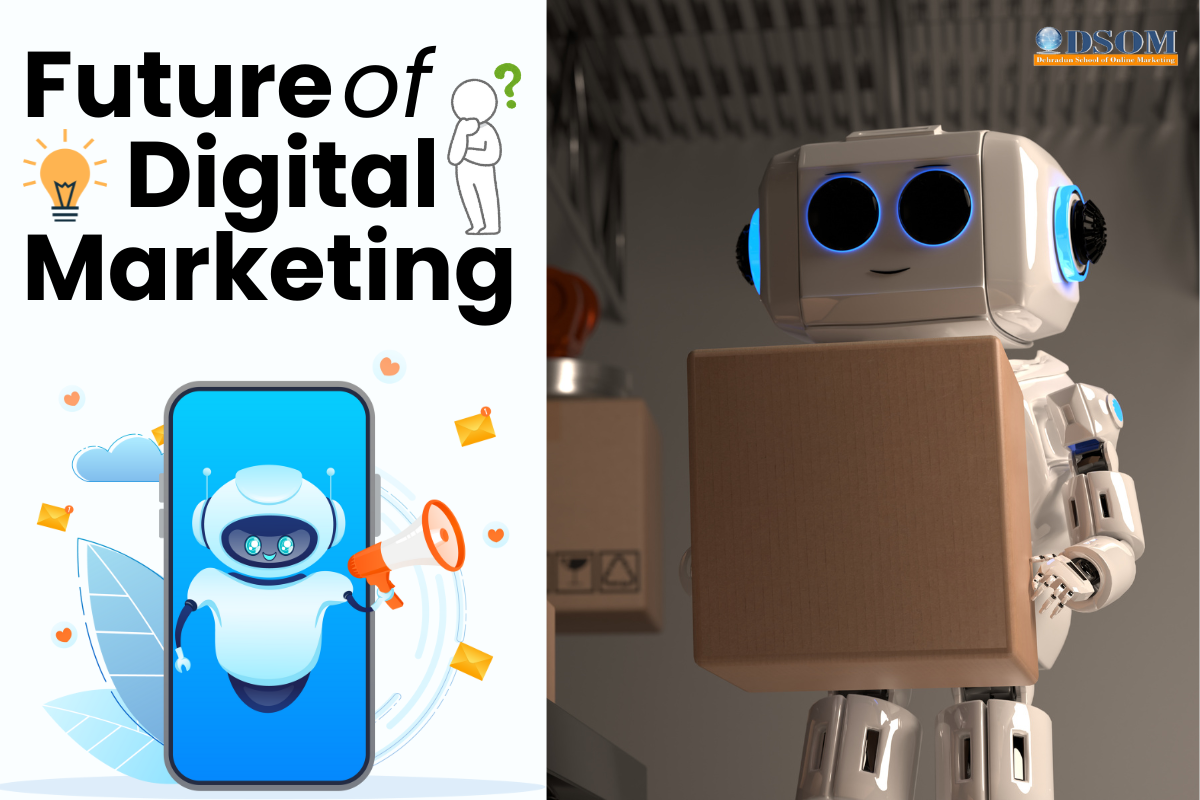 The Future of Digital Advertising: What You Need to Know
The Future of Digital Advertising: What You Need to Know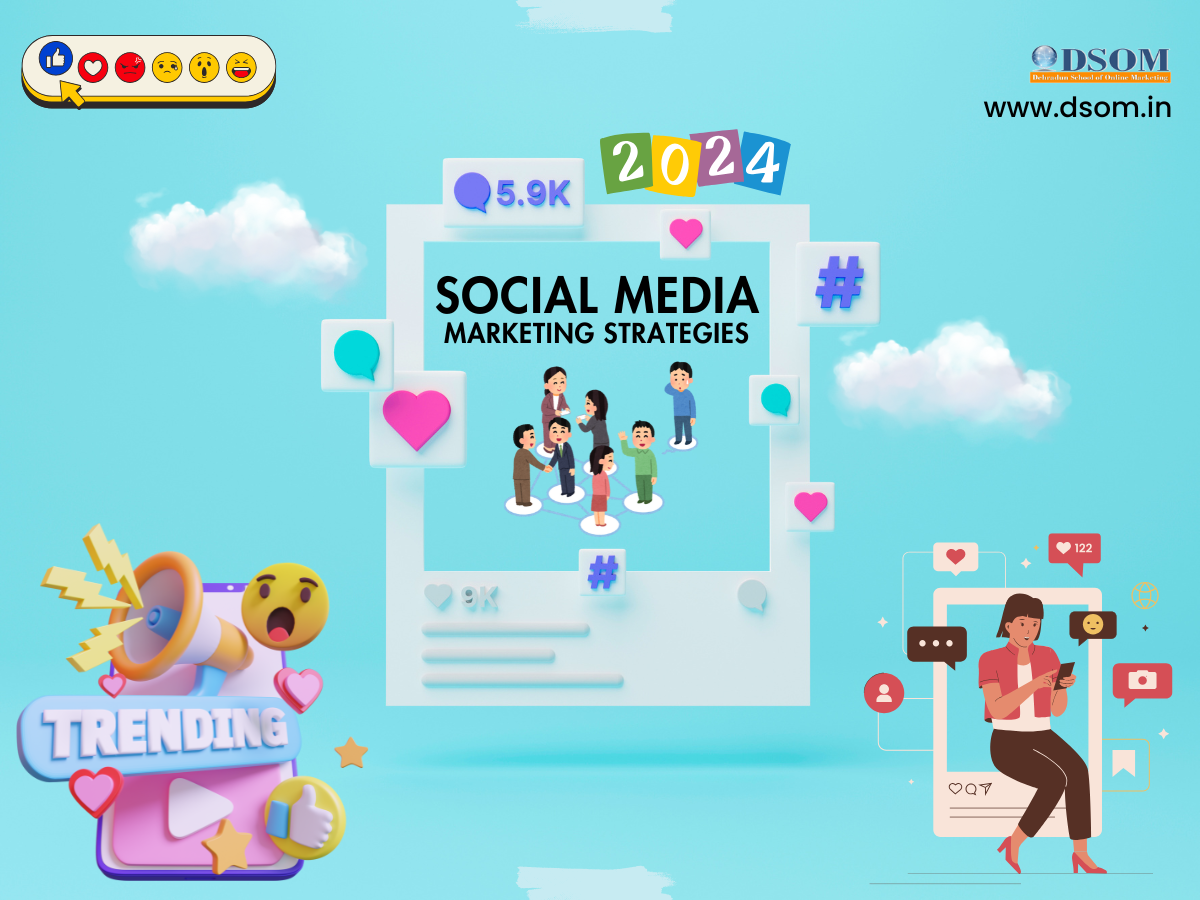 Social Media Marketing in 2024: Strategies for Maximum Engagement
Social Media Marketing in 2024: Strategies for Maximum Engagement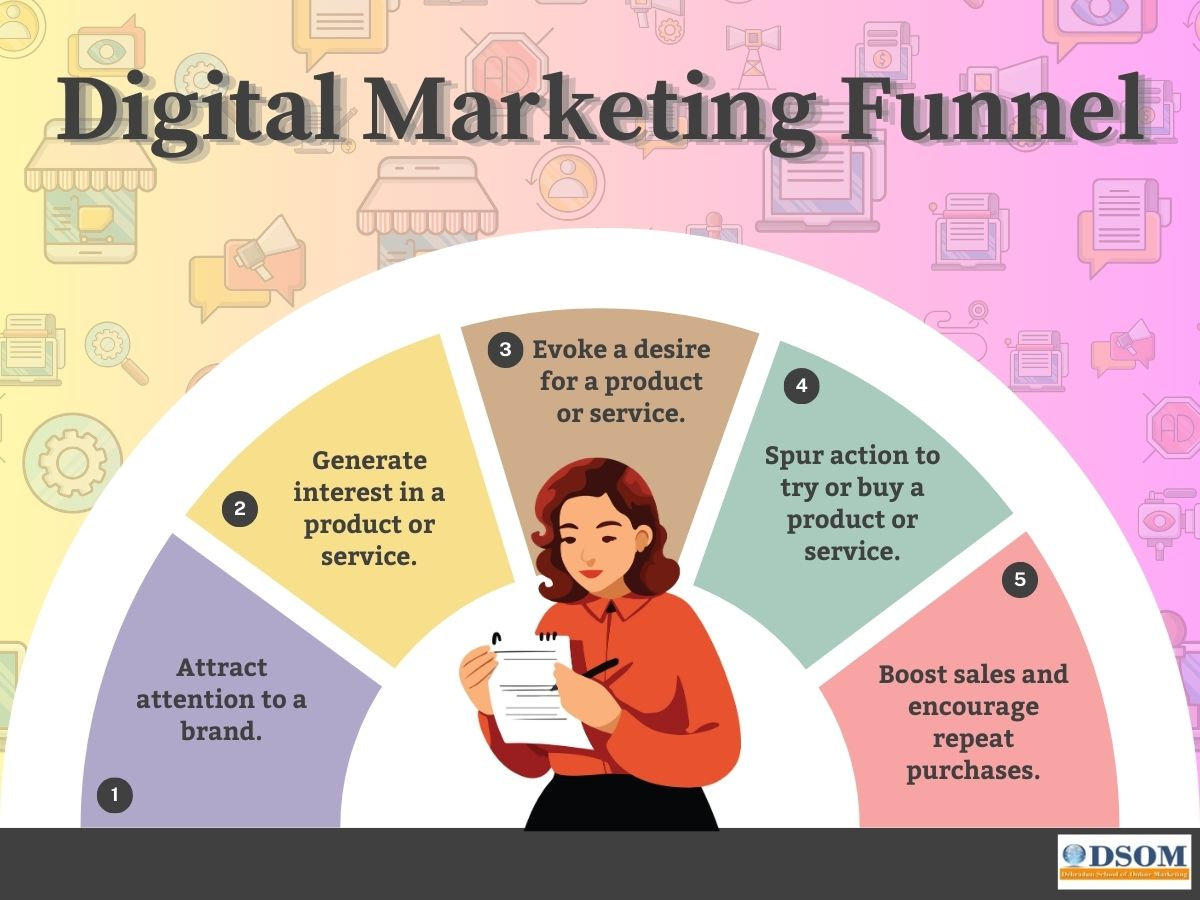 Building a Successful Digital Marketing Funnel: A Step-by-Step Guide
Building a Successful Digital Marketing Funnel: A Step-by-Step Guide 5 ways to make money from home using AI (Artificial-Intelligence) in 2024
5 ways to make money from home using AI (Artificial-Intelligence) in 2024Registration: DSOM
